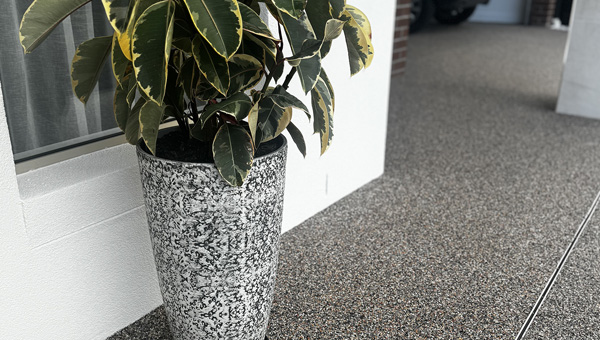Driveway resurfaces pavers represent a transformative approach to enhancing both the aesthetic appeal and functionality of your driveway.
These pavers are designed to be installed over existing surfaces, providing a fresh, new look without the need for complete removal and replacement. This method is a form of concrete resurfacing, which not only saves time and money but also offers a durable and attractive solution for homeowners and businesses alike. In this article, we will explore the many facets of driveway resurface pavers, from their benefits and types to installation processes and maintenance tips. By the end, you will have a comprehensive understanding of why resurface pavers might be the perfect choice for your driveway needs.
Understanding Driveway Concrete Resurfacing Pavers
Driveway resurfaces pavers are specialized paving stones that are installed over an existing driveway to improve its appearance and functionality. These pavers are installed over existing concrete surfaces, making the process more efficient and cost-effective. They come in various materials, including concrete, stone, brick, and asphalt, each offering unique benefits. Unlike traditional paving methods, which often require the complete removal of the old surface, resurfacing allows for a quicker and more cost-effective upgrade.
Common Materials Used
-
Concrete Resurface Pavers: Known for their strength and versatility, concrete pavers are a popular choice for driveway resurfacing. They can be molded into various shapes and sizes, providing a wide range of design options.
-
Stone Resurface Pavers: Natural stone pavers, such as granite, slate, or limestone, offer a luxurious and timeless appearance. They are highly durable and can withstand heavy loads, making them ideal for driveways.
-
Brick Resurface Pavers: Brick pavers bring a classic and traditional look to driveways. They are made from clay or concrete and are known for their durability and low maintenance requirements.
-
Asphalt Resurface Pavers: Asphalt pavers provide a smooth and sleek finish. They are often used for their cost-effectiveness and ease of installation, especially in larger driveways.
-
Exposed Aggregate Resurface Pavers: Exposed aggregate is an attractive option for driveway resurfacing. It offers a unique texture and appearance by exposing the small stones within the concrete. While it provides good traction and is aesthetically pleasing, it may have limitations in terms of erosion and design versatility compared to permeable paving options.
Comparison with Traditional Paving Methods
Traditional paving methods often involve the complete removal of the existing driveway surface, followed by the installation of new materials. This process can be time-consuming, labor-intensive, and costly. In contrast, driveway resurface pavers can be installed directly over the existing surface, reducing both the time and expense involved. Additionally, resurfacing allows for more design flexibility and can easily accommodate various patterns and styles.
Benefits of Driveway Resurface Pavers
-
Aesthetic Appeal: Resurface pavers can significantly enhance the visual appeal of your driveway. With a variety of materials, colours, and patterns available, you can create a customized look that complements your home’s exterior.
-
Durability and Longevity: Resurface pavers are designed to withstand heavy traffic and harsh weather conditions. When properly installed and maintained, they can last for many years, providing a long-term solution for your driveway.
-
Cost-Effectiveness: Compared to traditional paving methods, resurfacing is a more affordable option. The reduced labor and material costs make it a budget-friendly choice for homeowners looking to upgrade their driveways.
-
Low Maintenance: Driveway resurface pavers require minimal upkeep. Regular cleaning and occasional sealing are typically all that is needed to keep them looking their best.
Types of Driveway Resurface Pavers
-
Concrete Resurface Pavers: Available in various shapes, sizes, and finishes, concrete pavers can be customized to suit any design preference. They are also highly durable and can handle heavy loads.
-
Stone Resurface Pavers: Natural stone pavers offer a unique and elegant appearance. Each stone has its own distinct color and texture, creating a one-of-a-kind look for your driveway.
-
Brick Resurface Pavers: Brick pavers provide a classic and timeless aesthetic. They are also highly durable and can be easily replaced if damaged.
-
Asphalt Resurface Pavers: Asphalt pavers are a cost-effective option for large driveways. They provide a smooth surface that is easy to maintain and repair.
-
Tile Resurface Pavers: Tile pavers offer versatile design options, allowing for the creation of intricate patterns and designs. They are ideal for resurfacing existing tiled floors without the need for replacement, providing a fresh and updated look.
Selecting the Right Resurface Paver
Choosing the right type of resurface paver depends on several factors, including climate, budget, and personal preference. Here are some key considerations:
-
Climate and Weather Conditions: In areas with extreme temperatures or frequent freeze-thaw cycles, it is essential to choose pavers that can withstand these conditions without cracking or deteriorating.
-
Existing Concrete Base: Evaluating the existing concrete base is crucial for proper drainage and stability. Repurposing the existing concrete base for porous paving can offer significant environmental benefits and enhance water drainage.
-
Budget Considerations: While natural stone pavers may offer the most luxurious appearance, they are also the most expensive option. Concrete and asphalt pavers provide more budget-friendly alternatives without sacrificing quality.
-
Personal Preference: Ultimately, the choice of resurface pavers should reflect your personal style and the overall look you want to achieve for your driveway.
Installation Process
Installing driveway resurface pavers involves several steps to ensure a smooth and long-lasting finish. Here is an overview of the process:
-
Preparing the Existing Surface: The first step is to clean and prepare the existing driveway surface. This may involve removing any debris, filling cracks, and leveling the surface to ensure a smooth base for the pavers.
-
Laying the Pavers: Once the surface is prepared, the pavers are laid in the desired pattern. Proper spacing and alignment are crucial to achieving a professional finish.
-
Sealing and Finishing Touches: After the pavers are laid, they are sealed to protect against stains and weather damage. This step also enhances the color and appearance of the pavers.
Additionally, ensuring a non slip surface is important for safety. The permeable paving provides a non-slip surface in wet conditions, as water drains freely through the porous surface, preventing puddles from forming.
Maintenance Tips for Non Slip Surface Resurfaced Driveways
To keep your resurfaced driveway looking its best, follow these maintenance tips:
-
Regular Cleaning: Sweep the driveway regularly to remove dirt and debris. For deeper cleaning, use a pressure washer or a mild detergent solution.
-
Sealing and Resealing: Apply a sealant every few years to protect the pavers from stains and weather damage. This will also help maintain their color and appearance.
-
Repairing Damages: Address any cracks or chips promptly to prevent further damage. Replace any damaged pavers as needed to keep the surface even and attractive.
-
Ensuring Proper Drainage: Make sure that water drains freely from the surface to prevent puddles and erosion. Proper drainage will help maintain the integrity of the driveway and reduce the risk of damage.
Common Issues and Solutions
Even with proper maintenance, resurfaced driveways and other outdoor areas such as patios can encounter issues. Here are some common problems and their solutions:
-
Dealing with Cracks and Chips: Small cracks and chips can be repaired with a patching compound or by replacing the affected pavers. For larger cracks, consider consulting a professional for repairs.
-
Addressing Drainage Problems: Ensure that your driveway and other outdoor areas have proper drainage to prevent water pooling. This may involve adjusting the slope or installing drainage channels.
-
Preventing Weed Growth: Apply a weed barrier or use a herbicide to prevent weeds from growing between the pavers. Regularly inspect the driveway and other outdoor areas and remove any weeds that do appear.
Cost Analysis
Resurfacing your driveway with pavers can be a cost-effective option compared to traditional methods. Here is a breakdown of the costs:
-
Initial Costs: The cost of materials and labor for installing resurface pavers is typically lower than that of a complete driveway replacement.
-
Long-term Savings: Resurface pavers are durable and require less maintenance, leading to long-term savings on repairs and upkeep.
-
Comparing Costs with Other Paving Methods: While the initial cost of resurface pavers may be higher than asphalt, their longevity and low maintenance requirements make them a more cost-effective choice in the long run.
Environmental Impact
Driveway resurface pavers can have a positive impact on the environment:
-
Sustainable Materials: Many pavers are made from recycled materials, reducing the demand for new resources.
-
Eco-friendly Installation Practices: The installation process for resurface pavers, including concrete resurfacing, generates less waste compared to traditional paving methods. Concrete resurfacing repurposes existing concrete without excavation and landfill waste, using a fresh layer of material atop the current concrete.
-
Long-term Environmental Benefits: Durable and low-maintenance pavers reduce the need for frequent replacements and repairs, minimizing the environmental footprint.
Case Studies
-
Residential Driveway Resurfacing: A homeowner in a suburban area opted for concrete resurface pavers to enhance the curb appeal of their property. The project was completed in just a few days, providing a durable and attractive driveway that complemented the home’s exterior.
-
Commercial Driveway Resurfacing: A business owner chose asphalt resurface pavers for their parking lot. The quick installation process minimized disruptions to their operations, and the new surface provided a smooth and professional appearance.
-
Patio Resurfacing Project: A family decided to resurface their aging patio with porcelain pavers. Using rubber support pads, they created a 'floating' patio floor that is both durable and low-maintenance. The new patio design offered various aesthetic options, enhancing their outdoor living space.
-
Lessons Learned from Real-life Projects: These case studies highlight the importance of choosing the right materials and ensuring proper installation to achieve the best results.
Expert Insights
To gain further insights into driveway resurface pavers, we spoke with industry professionals:
-
Quotes from Industry Professionals: “Resurface pavers are an excellent choice for homeowners looking to upgrade their driveways without the hassle of a complete replacement,” says John Smith, a landscape architect.
-
Best Practices and Tips: Experts recommend regular maintenance and prompt repairs to keep your resurfaced driveway looking its best.
-
Future Trends in Driveway Resurfacing: Innovations in materials and installation techniques continue to improve the durability and appearance of resurface pavers, making them an increasingly popular choice.
Conclusion
In summary, driveway resurface pavers offer a cost-effective, durable, and attractive solution for upgrading your driveway. With various materials and designs available, they can be customized to suit any style and budget. Proper installation and maintenance are key to ensuring their longevity and performance. If you are considering a driveway upgrade, resurface pavers are a worthwhile investment that can enhance both the aesthetic appeal and functionality of your property.




